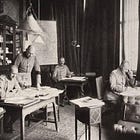The Division Command Post (Ib)
As seen by an American officer at the Kriegsakademie (1938)
On the eve of the Second World War, Albert Coady Wedemeyer of the US Army attended the Kriegsakademie in Berlin. Soon after completing, in July of 1938, the two-year course for future officers of the German General Staff, he submitted a pair of reports. The first of these provided a précis of the approach that the German Army took to tactics, leadership, and organization. The second described, in considerable detail, both the curriculum that he had followed and the ideal division featured in classroom exercises at the school
In the second report, the passage that describes the work of the sections that deal with logistics present a pair of problems. First, it uses terminology at odds with that used elsewhere in this series. Second, it includes such meaningless phrases as ‘the IVc [division veterinarian] is responsible for veterinary services’. Because of that, I have reduced the points that Wedemeyer to a chart of the sections that the Ib supervised and a list of things that present-day readers would find unusual.
The Ib deals directly with the IVa [Intendant] of the army corps to which the division is assigned.
The Ordonnanz Offizier (O2) assigned to the Ib, who also serves as an interpreter, generally receives his instructions directly from the chief of staff.
The IVa [Intendant] handles the supply of food for men, fodder for horses, and clothing. He does not, however, deal with motor fuel, lubricants for motor vehicles, or the maintenance of motor vehicles.
The Ib (and not the adjutant) supervises postal services.
For Further Reading:







What if the meaningless phrase was coded? We knew Germany was getting ready to wage war. Maybe that a more meaningful phrase and we just don't know how to decode it?